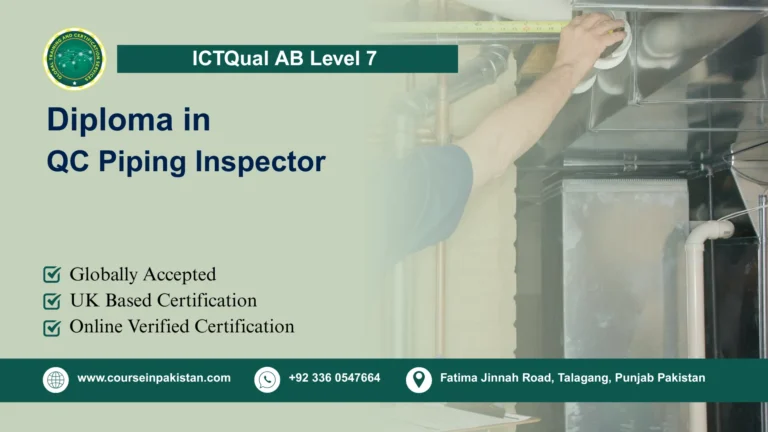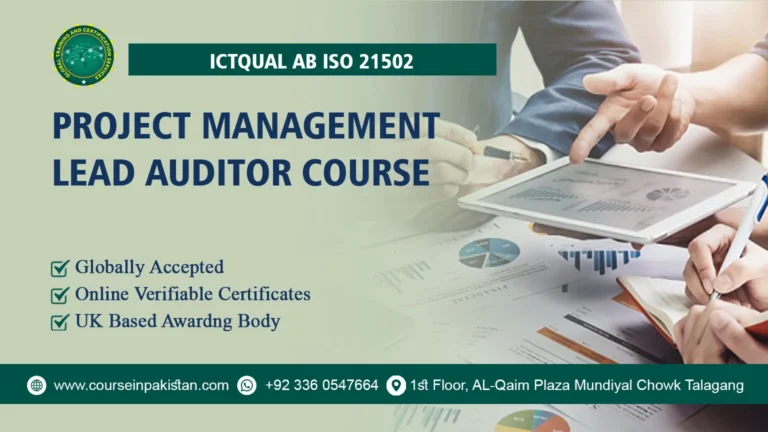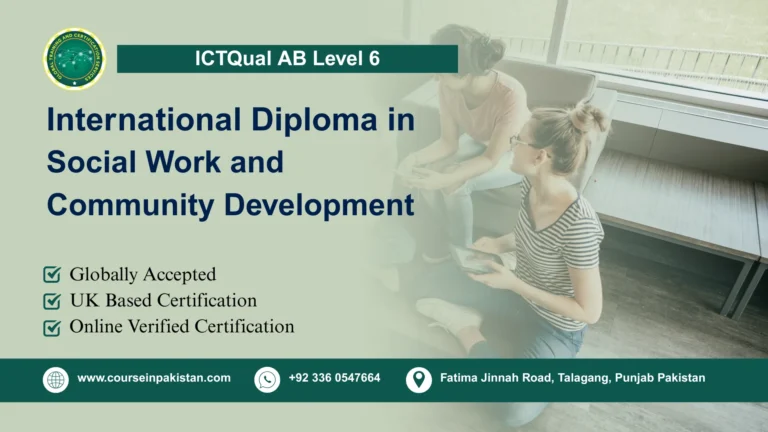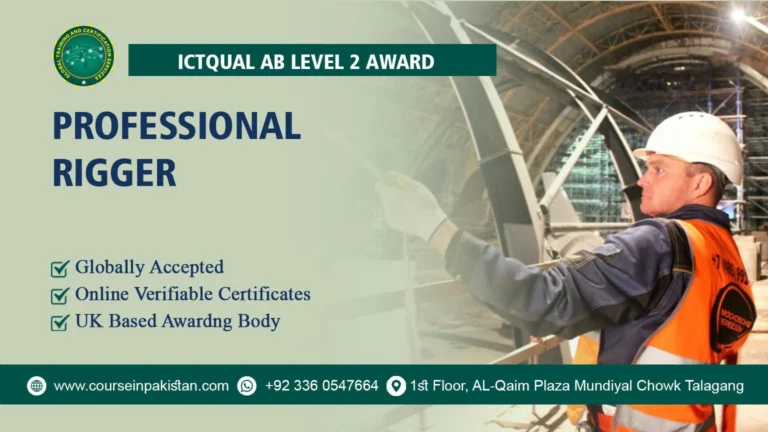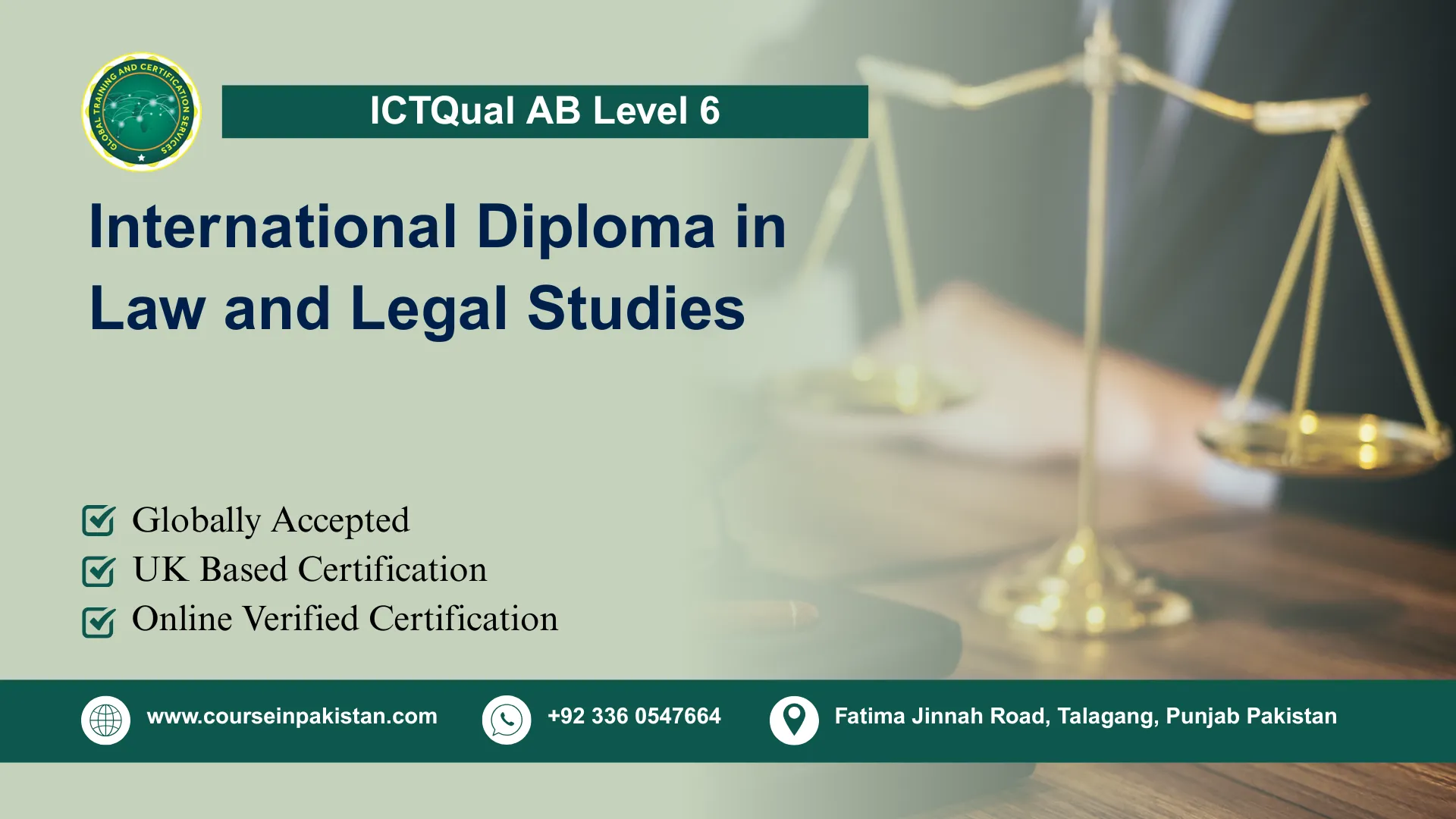
The ICTQual AB Level 6 International Diploma in Law and Legal Studies is designed to provide learners with an in-depth understanding of legal systems, principles, and practices. This course equips students with the knowledge and practical skills needed to navigate various legal frameworks, analyze legal issues, and apply law in professional contexts. It prepares learners for careers in legal consultancy, corporate law, compliance, and governance.
With a strong focus on both theory and application, this program addresses multiple areas of law, including international law, criminal law, corporate law, human rights, and legal research methods. The curriculum is structured to help learners develop critical thinking, analytical, and problem-solving skills, essential for legal professionals in today’s dynamic global environment. Whether you are a fresh graduate or an experienced legal practitioner, this program enhances your professional competence and career prospects.
Course Overview
The ICTQual AB Level 6 International Diploma in Law and Legal Studies is a 360-credit, fully assignment-based qualification that learners can complete at their own pace from anywhere in the world. The certification is verifiable by the British Council and attested by MOFA and Embassies, making it suitable for global recognition, career advancement, and iqama approval.
This qualification is ideal for both fresh learners and experienced professionals. Fresh students must complete all 36 mandatory assignments within three years. Experienced and competent individuals with at least 6 years of verifiable experience can fast-track the certification by demonstrating their knowledge in professional discussion meetings with an ICTQual AB Approved assessor, without completing all assignments.
This structure ensures flexibility, accessibility, and a globally recognized credential for individuals seeking advanced legal knowledge and practical application in professional settings.
Key Highlights of the Course:
- 360-credit, fully assignment-based program with flexible self-paced study.
- British Council verifiable, MOFA and Embassy attested for international recognition.
- Covers multiple areas of law including criminal, corporate, human rights, and international law.
- Suitable for fresh graduates and experienced legal professionals.
- Enhances career prospects in law, compliance, consultancy, and corporate governance with iqama approval.
Course Benefits
Global Recognition and Credibility
- Certification verified by British Council and attested by MOFA and Embassies.
- Provides internationally recognized qualifications to boost professional credibility.
Flexible Learning Structure
- Fully assignment-based program allows learners to progress at their own pace.
- Accessible from anywhere in the world, suitable for working professionals.
Comprehensive Legal Knowledge and Skills
- Covers diverse legal fields, including corporate, criminal, international law, and human rights.
- Develops analytical, critical thinking, and problem-solving skills for legal practice.
Career Advancement Opportunities
- Prepares learners for roles such as legal consultant, corporate legal advisor, compliance officer, or law enforcement professional.
- Supports professional growth with iqama approval and globally recognized certification.
Professional and Practical Application
- Encourages application of law in real-world scenarios and professional contexts.
- Enhances ability to navigate complex legal frameworks effectively.
Course Study Units
This qualification, the ICTQual AB Level 6 International Diploma in Law & Legal Studies, consists of 36 mandatory units.
Year 1 – Foundation in Political Science & International Relations
- Introduction to Political Science
- Foundations of International Relations
- Comparative Politics and Government Systems
- Political Ideologies and Theories
- History of Political Thought
- Principles of Public Administration
- Introduction to International Organisations
- Global History and World Politics
- Political Communication and Media Studies
- Research Methods in Political Science
- Human Rights and Social Justice
- Introduction to Diplomacy and Foreign Policy
Year 2 – Intermediate Political Science & International Relations
- Advanced Political Theory and Analysis
- International Law and Global Governance
- Political Economy and Development Studies
- Regional Studies: Europe, Asia, Africa, and the Middle East
- Conflict Resolution and Peace Studies
- Political Sociology and Social Movements
- Policy-Making and Public Policy Analysis
- International Political Economy
- Comparative Foreign Policy
- Security Studies and Global Challenges
- Research Methods and Data Analysis in Politics
- Ethics and Professional Practice in Political Science
Year 3 – Advanced Political Science & International Relations
- Contemporary Issues in International Relations
- Strategic Studies and National Security
- International Diplomacy and Negotiation
- Policy Analysis and Political Reform
- Globalisation and Transnational Politics
- Leadership and Governance in Political Institutions
- International Conflict and Crisis Management
- Political Risk Analysis and Strategic Decision-Making
- Environmental Politics and Global Sustainability
- International Cooperation and Development Projects
- Innovation and Emerging Trends in Global Politics
- Capstone Project in Political Science & International Relations
Learning Outcomes
Year 1 – Foundation in Political Science & International Relations
Introduction to Political Science
- Understand core concepts, structures, and functions of political systems.
- Analyze the role of politics in society and government decision-making.
Foundations of International Relations
- Explain fundamental principles and theories of international relations.
- Evaluate global political dynamics and their impact on international affairs.
Comparative Politics and Government Systems
- Compare political systems and governance structures across countries.
- Assess the effectiveness of various government models in policy implementation.
Political Ideologies and Theories
- Understand major political ideologies and their historical development.
- Apply political theory to contemporary political challenges.
History of Political Thought
- Analyze influential thinkers and their contributions to political philosophy.
- Evaluate the relevance of historical political ideas in modern governance.
Principles of Public Administration
- Understand public administration functions and organizational structures.
- Apply administrative principles to improve government operations.
Introduction to International Organisations
- Explain the role and functioning of key international organizations (e.g., UN, WTO).
- Assess their influence on global governance and international law.
Global History and World Politics
- Understand major historical events shaping international relations.
- Analyze geopolitical developments and their modern implications.
Political Communication and Media Studies
- Examine the role of media in shaping public opinion and policy.
- Apply communication strategies to political and diplomatic contexts.
Research Methods in Political Science
- Conduct qualitative and quantitative research in political studies.
- Analyze political data to support evidence-based conclusions.
Human Rights and Social Justice
- Understand human rights frameworks and social justice principles.
- Apply these principles in evaluating global legal and political systems.
Introduction to Diplomacy and Foreign Policy
- Explain the fundamentals of diplomacy and foreign policy formulation.
- Evaluate strategies used in international negotiation and conflict resolution.
Year 2 – Intermediate Political Science & International Relations
Advanced Political Theory and Analysis
- Critically analyze political ideologies and contemporary political issues.
- Apply theoretical frameworks to interpret political phenomena.
International Law and Global Governance
- Understand international legal frameworks governing state behavior.
- Apply principles of global governance to transnational issues.
Political Economy and Development Studies
- Examine the interaction between politics, economics, and development.
- Assess policies affecting economic growth and social welfare.
Regional Studies: Europe, Asia, Africa, and the Middle East
- Analyze political, economic, and social dynamics in different regions.
- Evaluate regional conflicts and cooperation mechanisms.
Conflict Resolution and Peace Studies
- Understand conflict causes, resolution strategies, and peacebuilding approaches.
- Apply conflict management techniques in practical scenarios.
Political Sociology and Social Movements
- Examine the role of society, culture, and social movements in politics.
- Assess the impact of social movements on policy and governance.
Policy-Making and Public Policy Analysis
- Understand policy development processes and evaluation techniques.
- Apply analytical tools to assess policy effectiveness.
International Political Economy
- Analyze global economic policies and their political implications.
- Evaluate international trade, finance, and economic governance structures.
Comparative Foreign Policy
- Compare foreign policies of different states and their international impact.
- Assess diplomatic strategies in achieving national objectives.
Security Studies and Global Challenges
- Understand global security threats and risk assessment frameworks.
- Develop strategies to address contemporary security challenges.
Research Methods and Data Analysis in Politics
- Conduct in-depth political research using advanced methodologies.
- Apply data analysis to interpret political trends and outcomes.
Ethics and Professional Practice in Political Science
- Understand ethical frameworks in politics and international relations.
- Apply ethical decision-making in professional political and legal contexts.
Year 3 – Advanced Political Science & International Relations
Contemporary Issues in International Relations
- Analyze current global issues and their impact on international law.
- Develop solutions for complex international challenges.
Strategic Studies and National Security
- Understand strategic defense concepts and national security policies.
- Apply strategic planning to address security and geopolitical risks.
International Diplomacy and Negotiation
- Apply diplomatic strategies and negotiation techniques in global contexts.
- Evaluate outcomes of diplomatic engagements and treaties.
Policy Analysis and Political Reform
- Assess existing policies and propose reforms for improved governance.
- Use analytical frameworks to guide decision-making in policy.
Globalisation and Transnational Politics
- Examine the effects of globalization on state sovereignty and politics.
- Analyze transnational issues like trade, migration, and climate change.
Leadership and Governance in Political Institutions
- Develop leadership skills within governmental and international organizations.
- Apply governance principles to enhance institutional effectiveness.
International Conflict and Crisis Management
- Understand causes and dynamics of international conflicts.
- Apply crisis management techniques to mitigate global risks.
Political Risk Analysis and Strategic Decision-Making
- Evaluate political risks in global business and governance contexts.
- Use strategic decision-making tools for risk mitigation.
Environmental Politics and Global Sustainability
- Understand environmental policies and their political implications.
- Apply sustainability principles in policymaking and international agreements.
International Cooperation and Development Projects
- Analyze frameworks for international cooperation and development.
- Implement strategies to manage transnational development initiatives.
Innovation and Emerging Trends in Global Politics
- Identify trends influencing global political and legal environments.
- Apply innovative approaches to address complex international challenges.
Capstone Project in Political Science & International Relations
- Integrate knowledge and skills from all units in a research-based project.
- Demonstrate analytical, problem-solving, and strategic decision-making abilities in political and legal contexts.
Who is This Course For?
Fresh Graduates and Early-Career Professionals
- Individuals with backgrounds in law, political science, international relations, or related fields seeking foundational knowledge.
- Learners aiming to develop practical legal skills and analytical capabilities for professional application.
Experienced Legal Practitioners
- Professionals with 6+ years of verifiable legal or compliance experience seeking formal certification.
- Candidates who want fast-track recognition through professional discussions without completing all assignments.
Strategic Thinkers and Policy Analysts
- Learners aspiring to roles in legal consultancy, policy analysis, corporate governance, or international law.
- Individuals interested in developing critical thinking, research, and decision-making skills for complex legal and political scenarios.
Global Career Aspirants
- Candidates seeking international recognition and iqama approval through British Council verification and MOFA/Embassy attestation.
- Professionals aiming to work in multinational law firms, government agencies, NGOs, or corporate compliance departments.
Future Progression
- Eligibility for roles such as Legal Advisor, Compliance Officer, Corporate Counsel, or Policy Analyst.
- Advancement to senior legal or governance positions, including Legal Manager or Director of Compliance.
- Opportunities to join international organizations, law firms, NGOs, or government institutions.
- Pathways to postgraduate studies such as LLM, MSc in International Law, or Public Policy programs.
- Professional networking and recognition through international law and governance associations.
Academic Pathways:
- Progression to Level 7 Diplomas in Legal Studies, Law , or Corporate Governance.
- Entry into Master’s programs in Law, International Relations, or Policy and Governance.
- Opportunities for research-based degrees (MPhil/PhD) in law, legal studies, or political science.
- Eligibility for professional accreditation and membership with global legal and compliance bodies.
Conclusion
The ICTQual AB Level 6 International Diploma in Law and Legal Studies equips learners with comprehensive legal knowledge, analytical skills, and practical expertise for a wide range of professional roles. Its flexible, assignment-based structure allows learners to study at their own pace, while experienced professionals can fast-track certification through professional discussion assessments. With British Council verification, MOFA, and Embassy attestation, this qualification provides global recognition, iqama approval, and enhanced career prospects in legal consultancy, corporate governance, international law, and policy advisory roles worldwide.

